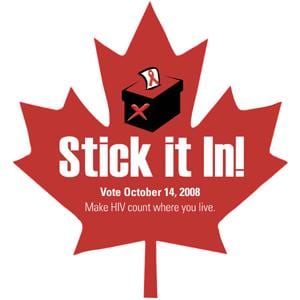The possibility of Stephen Harper winning a majority government in this election has queer activists terrified.
“I think that would be a disaster for the gay community,” says Helen Kennedy, the executive director of gay and lesbian lobby group Egale Canada. “Based on what he’s done very subtly over the course of his time as prime minister that would be a disaster.”
Kennedy points to a number of bills the Conservatives have managed to pass despite being in a minority government.
“Harper has really pushed forward with his agenda because [Liberal leader Stephane] Dion has let him go,” she says.
Kennedy says Egale will be focussing on immigration, blood and organ donation bans and cuts to the Court Challenges Program and HIV/AIDS programs.
The Tories passed a bill that grants the minister of immigration — Diane Finley in the Harper government — the power to unilaterally decide which groups or individual refugee claimants will be allowed into the country. Gay and lesbian activists warn that such discretionary powers could be used against queer immigrants.
“Diane Finley, she’s someone we’re keeping an eye on,” says Kennedy. “Harper’s seeking to politicize the immigration system and allow for discriminatory decisions.
“The newcomers’ website, which welcomes people to Canada, still defines marriage as being between a man and a woman, which is outrageous.”
Kennedy says Egale, through a Freedom of Information request to the Immigration and Refugee Board, has noticed a negative trend towards queer claimants, especially bisexual people.
She also singles out the government’s decision in December to establish new rules for organ donations from gay men.
Under the new rules any man who has had sex with another man even once in the past five years is prohibited from donating unless doctors and recipients go through a special “exceptional release” process, certifying that they are aware of the risk involved in using organs from a gay man.
Health Canada also bans any man who has had sex with another man even once since 1977 from donating blood or bone marrow.
Frank Markel, president of the Trillium Gift of Life Network, which oversees organ donations in Ontario, told Xtra in August that he has tried to persuade the federal government to change the rules.
“We did take the step of writing the federal minister to say he should appreciate that, intentionally or not, this had offended the gay community,” he said. “We asked him to reopen the discussion, to look at the epidemiological evidence of what constitutes high risk. His answer was to say he was not prepared to create a special committee. These are the powers of the federal government.”
Health minister Tony Clement’s stance on harm reduction also worries Egale. At the recent International AIDS Conference in Mexico City Clement vowed to shut down Vancouver’s safe injection site.
Richard Elliott, the executive director of the Canadian HIV/AIDS Legal Network, told Xtra after the conference that Clement was completely wrong.
“It’s an embarrassment for Canada,” he said. “It’s become very clear that we have a health minister, and presumably a government behind him, who are denialists. It’s similar to the condemnation the South African government received for denying that HIV causes AIDS.
“I didn’t have the sense that there was anyone else from other countries, medical or government representatives, speaking out against harm reduction. The current Canadian government is out of step with any rational response and out of step with the rest of the world.”
Rick Kennedy, the executive director of the Ontario AIDS Network, says that government cuts of more than $1 million to HIV/AIDS programs in Ontario will be the focus of his group’s Stick It In election campaign.
“We won’t be endorsing a particular party,” says Rick Kennedy. “As a charity we can’t do that. But the issue around the reduction of funding is still ongoing.
“Cutting funding is cutting people’s lives. We’re fighting for funding for services. We also want to make sure we have effective prevention, education and anti-stigma programs. Stigma is one of the chief contributors to HIV/AIDS. We want to see leadership on that issue.”
Rick Kennedy says that federal action on housing for people with HIV or AIDS is also lacking.
“The offloading of housing to the provinces is very problematic for people with AIDS,” he says. “We’re looking for parties to make a commitment to housing people with HIV and AIDS.”
Critics also point to the government’s attempt to pass a bill that would have granted the minister of culture the power to deny tax credits to any film she deemed contrary to “public policy.” The government has also announced a recent series of cuts to arts programs that take Canadian artists abroad or bring international buyers to Canada.


 Why you can trust Xtra
Why you can trust Xtra


